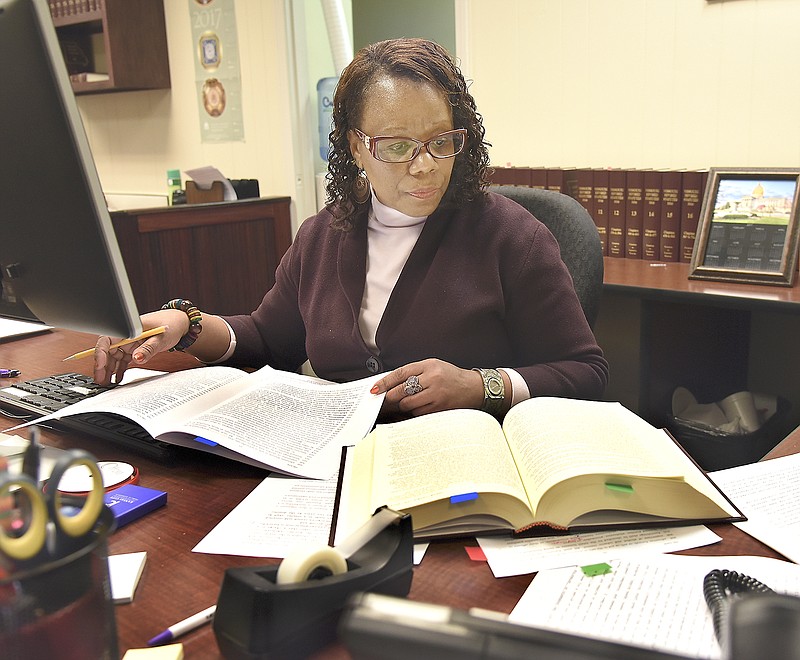Editor's Note: Republicans in the Missouri Legislature also detailed their 2018 legislative priorities. Read that article here.
Democrats in the Missouri House hope their colleagues will support a 10-bill ethics reform package - including a proposal to prohibit government officials or employees from using data-purging applications while conducting public business; another to require a two-year waiting period between the end of a lawmaker's last term and working as a lobbyist; and a measure that would require secretive, "dark money" organizations to report all of their expenditures made in support of or opposition to a candidate or ballot measure, as well as other spending made on behalf of elected officials.
"Last year, House Democrats filed a package of ethics bills that basically mirrored (Gov. Eric Greitens') campaign promises," Rep. Kip Kendrick, D-Columbia, said at a Capitol news conference.
"While the governor's rhetoric sounded good, he failed to follow through on many of his promises, (and) instead, it seems that he's engaged in a pattern and practice that are meant to hide the true workings of his administration and campaign from the public."
Kendrick, who is the minority whip who lines up his caucus members' votes, noted: "Our mission as elected officials should always be to restore people's trust in government."
He said the measures should be seen as bipartisan.
"Dark money" groups are those that can make donations without identifying the source or amounts of money they receive, unlike those that contribute directly to a candidate's campaign.
As one example, Kendrick cited A New Missouri, a nonprofit organization that supports Greitens and has issued news releases and campaign ads against people and lawmakers who have disagreed with the governor's ideas.
"This bill that I filed is aimed at shedding light on 'dark money' groups by requiring that the political expenditures be disclosed just like non-committee expenditures must be disclosed," he said. "Transparency is critical for the public to be able to evaluate the merits of political messages - and to know when certain special interests are spending significant amounts of money to influence government and influence policy."
On a related topic, Rep. Tommie Pierson Jr., D-St. Louis, would "require the Inaugural Committee's fundraising activities to be disclosed," he said. "Even before one's first day in office, you can have these entities to be able to fund what it is that you're doing.
"Instead of engaging as politics as usual, our governor has broken that promise by hiding what those big donations were."
Rep. Gina Mitten, D-Richmond Heights, sponsors the bill blocking social media applications that erase a message after it's been read.
"It would apply to the Legislature (too)," she said. "It does require archiving" those messages.
She said a lawsuit filed Friday in Cole County asks the courts to address the use of the applications - such as "Confide," which the Kansas City Star reported last month was being used by Greitens and some of his staff members - on privately owned devices when the messages are about public business.
Rep. Joe Adams, D-University City, has filed the bill limiting what often is called the "revolving door" between lawmakers and lobbying jobs.
"When you end being a legislator, right now the law says (you have to wait) six months," he said. "That is too short of a time period.
"We've got to make sure there is no undue influence in legislation."
Adams admitted being a lobbyist isn't an illegal job, but he doesn't think that requiring a "cooling off period" before a former lawmaker can lobby is any infringement on the lawmaker's free speech rights.
"Government is not a business," Adams said. "Government is about the people.
"And you've got to be transparent and protect the people's interest - and I'm not really sure that if one day you're a lawmaker and the next day you're a lobbyist, are you really protecting the people's interests?"
Kendrick acknowledged the Democrats don't have enough seats to force the House to debate their proposals.
However, he said: "The ethics platform that we've filed holds politicians' feet to the fire.
"House Democrats are ready to take action to end politics as usual - and we stand ready to fulfill the election promises made by both parties in Missouri."

